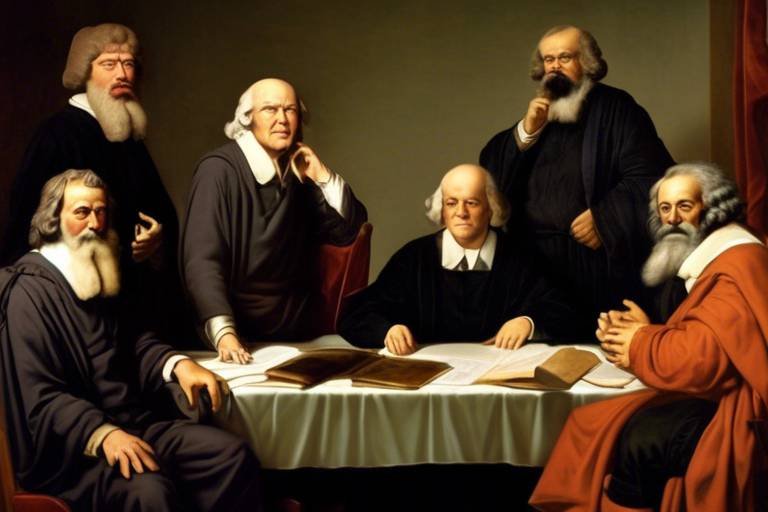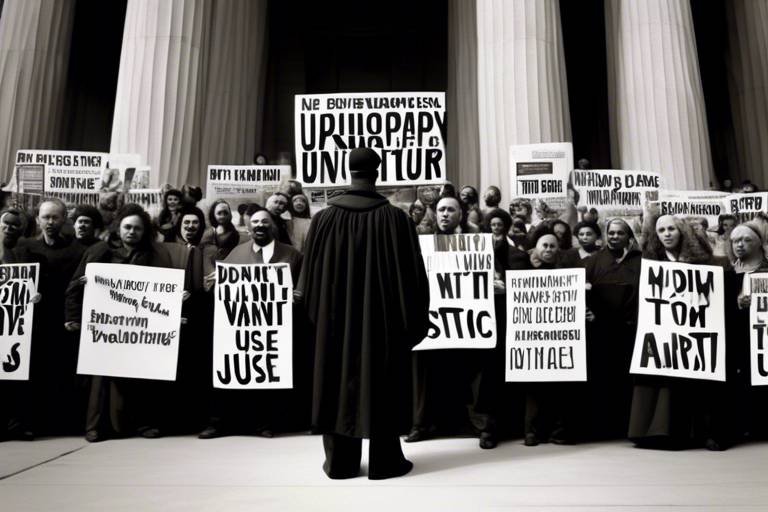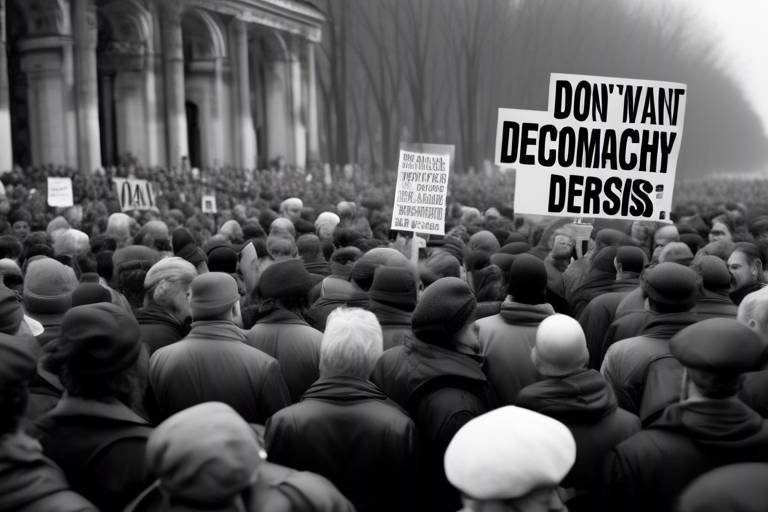Understanding Surveillance Politics through Philosophy
In today's world, where technology permeates every aspect of our lives, the intersection of surveillance and politics has never been more critical. As we navigate through digital landscapes filled with cameras, social media, and data tracking, we must pause and reflect on the underlying philosophical implications of these practices. What does it mean to live in a society where our every move can be monitored? How does this affect our freedoms and rights as individuals? These questions are not merely academic; they resonate deeply in our daily lives and shape the way we interact with the world around us.
Surveillance politics is a complex web of ethical dilemmas, historical contexts, and philosophical theories that challenge our understanding of privacy, security, and autonomy. At its core, surveillance raises significant moral questions about the balance between protecting society and preserving individual freedoms. As we delve into this topic, we will explore the ethical dimensions of surveillance, the historical evolution of monitoring practices, and the philosophical theories that provide a framework for understanding these issues.
As we embark on this exploration, consider the implications of living in a world where surveillance is ubiquitous. Are we sacrificing our privacy for the sake of security? Or are we simply becoming more aware of the ways in which our actions are observed and recorded? By examining these questions through a philosophical lens, we can gain a deeper insight into the societal impacts of surveillance and the ethical responsibilities that come with it.
Throughout this article, we will uncover the historical contexts that have shaped surveillance practices, from totalitarian regimes that wielded power through fear and control to democratic societies that grapple with the need for security in an increasingly dangerous world. We will also dissect various philosophical theories, such as utilitarianism and Kantian ethics, to understand how they inform our perspectives on surveillance and its implications for individual autonomy.
Ultimately, understanding surveillance politics through philosophy is not just about analyzing data and technologies; it's about recognizing the profound impact these practices have on our lives and the choices we make. As we navigate this digital age, it is crucial to engage in these discussions, challenge the status quo, and advocate for a future where our rights and freedoms are respected and upheld.
- What is surveillance politics? Surveillance politics refers to the ways in which surveillance practices intersect with political power, influencing governance, societal norms, and individual rights.
- Why is it important to consider the philosophical implications of surveillance? Examining the philosophical aspects of surveillance helps us understand the ethical dilemmas and societal impacts of monitoring practices, guiding us toward informed discussions about privacy and security.
- How have surveillance practices evolved over time? Surveillance practices have evolved from historical instances of state control in totalitarian regimes to modern-day technologies used in democratic societies, often raising concerns about civil liberties.
- What philosophical theories are relevant to understanding surveillance? Key philosophical theories include utilitarianism, which considers the balance between individual privacy and collective security, and Kantian ethics, which emphasizes respect for individual autonomy and dignity.

The Ethical Dimensions of Surveillance
In our modern society, the intersection of surveillance and ethics is a hotbed of debate. As technology advances, the ability to monitor individuals has become increasingly sophisticated, leading to a complex web of moral considerations. One of the most pressing issues is the right to privacy. In a world where our digital footprints are constantly tracked, how do we define what constitutes an invasion of privacy? Many argue that the mere act of surveillance can be an infringement on individual rights, raising questions about consent and the extent to which people are aware of being monitored.
Moreover, the balance between security and individual freedoms is a delicate one. On one hand, surveillance can be justified in the name of public safety, especially in the wake of terrorist threats and crime. However, this justification often leads to a slippery slope where the government may overreach, encroaching on personal liberties. It’s a classic case of the age-old question: how much freedom are we willing to sacrifice for the sake of security?
To illustrate these ethical dilemmas, consider the following points:
- Informed Consent: Are individuals truly consenting to be surveilled when they use technology? Often, users click 'agree' without fully understanding the implications.
- Data Ownership: Who owns the data collected through surveillance? The ambiguity surrounding data ownership raises ethical concerns about exploitation.
- Surveillance Capitalism: Companies often use surveillance for profit, leading to questions about the morality of commodifying personal information.
As we navigate these ethical dimensions, it’s crucial to consider the implications of surveillance not just on an individual level, but also on a societal scale. The normalization of surveillance can lead to a culture where individuals feel constantly watched, creating a chilling effect on free expression and dissent. This is particularly relevant in democratic societies, where citizens must feel empowered to voice their opinions without fear of repercussions.
Furthermore, the ethical landscape of surveillance is not static; it evolves with societal values and technological advancements. For instance, the introduction of artificial intelligence in surveillance raises new ethical questions about bias and accountability. How do we ensure that the algorithms used in surveillance practices are fair and do not perpetuate discrimination? This is an ongoing challenge that requires continuous dialogue among ethicists, technologists, and policymakers.
In conclusion, the ethical dimensions of surveillance are multifaceted and complex. They compel us to question our values and the kind of society we wish to create. As we grapple with these issues, it’s essential to engage in open discussions about the implications of surveillance, ensuring that we protect individual rights while also considering collective security. The future of surveillance will likely rest on our ability to find a balance that respects both privacy and safety.
Q: What is the primary ethical concern regarding surveillance?
A: The primary ethical concern revolves around the right to privacy and the potential for abuse of power by authorities or corporations.
Q: How does surveillance impact individual freedoms?
A: Pervasive surveillance can create a culture of fear and compliance, stifling free expression and dissent among individuals.
Q: Are there any legal frameworks governing surveillance practices?
A: Yes, many democratic societies have established legal frameworks to regulate surveillance, balancing security needs with individual rights.
Q: What role does technology play in modern surveillance?
A: Technology enhances surveillance capabilities, allowing for real-time monitoring and data collection, which raises new ethical and privacy concerns.

Historical Context of Surveillance
The practice of surveillance has deep roots that stretch back through centuries of human history, evolving alongside political structures and technological advancements. From the early days of monitoring subjects in ancient civilizations to the sophisticated digital tracking of today, surveillance has often been a tool wielded by those in power to maintain control over their citizens. It raises a myriad of questions about ethics, rights, and the very nature of freedom. How did we get here? What lessons can we learn from the past to inform our present and future?
In ancient times, rulers often employed spies to gather intelligence about their enemies and subjects. The Roman Empire, for example, relied on a network of informants to keep tabs on potential threats. This practice was not merely about security; it was about asserting dominance and instilling fear. Fast forward to the Middle Ages, and we see a similar pattern with monarchs using informants and secret police to suppress dissent and maintain their reign.
However, the modern era of surveillance began to take shape with the advent of technology. The Industrial Revolution brought forth innovations that allowed for more systematic and widespread monitoring. The introduction of the telegraph and later the telephone revolutionized communication, making it easier for governments to intercept and surveil conversations. The 20th century saw the rise of more organized and institutionalized forms of surveillance, particularly during periods of political upheaval.
Totalitarian regimes have historically taken surveillance to new extremes, using it as a means to suppress dissent and control the populace. These governments employ a variety of tools and tactics to monitor their citizens, often justifying their actions in the name of national security. The infamous Stasi in East Germany and the KGB in the Soviet Union serve as stark examples of how surveillance can be weaponized against the very people it is meant to protect.
The Stasi, or Ministry for State Security, was notorious for its extensive surveillance network that infiltrated nearly every aspect of East German life. With over 90,000 official employees and hundreds of thousands of informants, the Stasi maintained a culture of fear, where citizens were constantly aware that they could be watched. Similarly, the KGB employed a range of tactics, from wiretapping to psychological manipulation, to control the narrative and suppress opposition.
The implications of such pervasive surveillance are profound. In totalitarian regimes, the erosion of civil liberties is often a gradual process, where individuals begin to self-censor their thoughts and actions out of fear of reprisal. The chilling effect of surveillance creates a society where freedom of expression is stifled, and dissent is virtually nonexistent. The constant monitoring leads to a culture of compliance, where individuals prioritize safety over their rights.
Interestingly, surveillance is not limited to oppressive regimes. Democratic societies also engage in surveillance practices, often framed as necessary for public safety. Governments justify these actions by citing the need to protect citizens from threats, whether they be domestic or international. However, this raises significant ethical questions about the balance between security and individual rights. Are we willing to sacrifice our privacy for the illusion of safety?
As we reflect on the historical context of surveillance, it becomes clear that the conversation is not merely about technology or policy. It's about the fundamental values we hold dear as a society. The lessons learned from the past can guide us in navigating the complex landscape of surveillance in the modern world, ensuring that we do not repeat the mistakes of history.
- What is the purpose of surveillance in modern society? Surveillance is often justified as a means to enhance security, prevent crime, and monitor potential threats.
- How does surveillance impact individual privacy? Surveillance can significantly infringe on personal privacy, leading to a culture of fear and self-censorship.
- What can be done to protect civil liberties in the face of increasing surveillance? Advocacy for strong privacy laws and transparency in surveillance practices is essential to protect individual rights.

Surveillance in Totalitarian Regimes
Surveillance in totalitarian regimes is not just a tool; it is a fundamental mechanism of control, deeply woven into the fabric of governance. These systems thrive on the idea that knowledge is power, and by surveilling their citizens, they can maintain an iron grip on society. Imagine living in a world where every move you make, every word you utter, and every thought you contemplate is under scrutiny. This is the grim reality for individuals in totalitarian states, where the government employs a range of sophisticated surveillance techniques to monitor and manipulate the populace.
Totalitarian regimes, such as those seen in North Korea, the Soviet Union, and East Germany, have historically relied on extensive surveillance networks to suppress dissent and control public perception. They utilize various methods, from informants and secret police to advanced technology, ensuring that any hint of opposition is swiftly silenced. The chilling effect of such surveillance creates a culture of fear, where individuals are constantly aware that they are being watched, leading to self-censorship and compliance. In this environment, the very essence of personal freedom is suffocated, as citizens become prisoners of their own thoughts.
To illustrate the extent of surveillance in these regimes, consider the following key features:
- Informant Networks: Governments often recruit ordinary citizens to act as informants, creating a pervasive atmosphere of distrust. Neighbors spy on neighbors, friends report on friends, and the fabric of community life is torn apart.
- Technological Surveillance: The use of technology, such as cameras and listening devices, allows regimes to monitor citizens in real-time, making it nearly impossible to escape scrutiny.
- Legal Frameworks: Laws are manipulated to justify invasive surveillance practices, often framed as necessary for national security or public safety.
Historical examples further underscore the brutal realities of surveillance in totalitarian regimes. The Stasi in East Germany, for instance, was infamous for its extensive spying apparatus, employing over 90,000 agents and countless informants to keep tabs on a population of just 16 million. This level of surveillance infiltrated every aspect of life, from workplaces to social gatherings, ensuring that dissent was not just discouraged but practically impossible. Similarly, the KGB in the Soviet Union operated with similar fervor, employing tactics that included wiretapping, physical surveillance, and psychological manipulation to maintain the Communist Party's grip on power.
The implications of such pervasive surveillance extend beyond mere privacy violations; they erode civil liberties and foster a culture where fear reigns supreme. Citizens learn to conform, not out of agreement with the regime, but out of a deep-seated instinct for self-preservation. The price of dissent becomes too high, leading to a populace that is compliant, if not enthusiastic, about the regime's policies.
In conclusion, surveillance in totalitarian regimes serves as a powerful reminder of the dangers posed by unchecked state power. It raises critical questions about the balance between security and freedom, and challenges us to reflect on the ethical implications of surveillance practices in our own societies. As we navigate the complexities of modern governance, it is essential to remain vigilant against the encroachment of surveillance into our lives, lest we find ourselves living in a world where freedom is merely an illusion.

Case Studies: Stasi and KGB
The Stasi, officially known as the Ministry for State Security, operated in East Germany from 1950 until the fall of the Berlin Wall in 1989. This organization became infamous for its extensive and intrusive surveillance practices, which aimed to monitor the population and suppress dissent. The Stasi employed a vast network of informants, estimated to be around 1 in 50 East Germans, who reported on their neighbors, friends, and even family members. This culture of distrust fostered an environment where individuals were constantly aware that they could be watched, leading to self-censorship and a pervasive atmosphere of fear.
In stark contrast, the KGB (Committee for State Security) was the main security agency for the Soviet Union, operating from 1954 until the dissolution of the USSR in 1991. The KGB was not only responsible for internal security but also played a significant role in espionage and foreign intelligence. The organization utilized a variety of methods to maintain control over the Soviet populace, including surveillance through wiretaps, monitoring of mail, and infiltration of various social groups. The KGB's reach extended far beyond the borders of the Soviet Union, as it engaged in international operations to suppress dissent and promote Soviet interests globally.
Both the Stasi and KGB exemplified the extreme measures taken by totalitarian regimes to surveil their citizens. These organizations employed sophisticated technologies and psychological tactics to instill fear, ensuring that any form of opposition was swiftly dealt with. The consequences for individuals caught in the web of surveillance were dire, often resulting in imprisonment, forced labor, or worse. The chilling effect of such pervasive monitoring not only stifled dissent but also eroded trust within communities, creating a society where people were wary of each other.
To better illustrate the methods and impact of these organizations, the following table summarizes key differences and similarities between the Stasi and KGB:
| Aspect | Stasi | KGB |
|---|---|---|
| Country | East Germany | Soviet Union |
| Years Active | 1950-1989 | 1954-1991 |
| Primary Focus | Internal surveillance and control | Internal security and foreign intelligence |
| Methods | Informants, wiretaps, psychological manipulation | Espionage, monitoring of communications, infiltration |
| Impact on Society | Culture of fear and self-censorship | Suppression of dissent, paranoia among citizens |
In conclusion, the case studies of the Stasi and KGB provide a stark reminder of the lengths to which totalitarian regimes will go to maintain power through surveillance. The psychological and social ramifications of such practices extend far beyond the immediate impact on individuals; they shape the very fabric of society, creating an environment where freedom is sacrificed for the illusion of security.

Impact on Civil Liberties
The pervasive nature of surveillance in totalitarian regimes has profound implications for civil liberties. When a government constantly monitors its citizens, it creates an environment where fear and compliance become the norm. Individuals may feel pressured to conform to societal expectations, knowing that their actions are being scrutinized. This atmosphere stifles freedom of expression, as people may refrain from voicing dissenting opinions or engaging in political activism out of concern for potential repercussions.
Moreover, the erosion of privacy rights is a significant concern. In a society where surveillance is rampant, the concept of personal space diminishes. Citizens may find themselves under constant watch, leading to a sense of vulnerability and helplessness. The right to privacy, which is fundamental to individual autonomy, becomes compromised, as the state justifies its actions under the guise of maintaining order and security.
To illustrate the impact on civil liberties, consider the following key areas affected by surveillance:
- Freedom of Speech: Surveillance can lead to self-censorship, where individuals avoid discussing controversial topics for fear of being monitored.
- Right to Assemble: The presence of surveillance can deter people from gathering in public spaces for protests or demonstrations, limiting their ability to express collective dissent.
- Due Process: In some cases, surveillance data may be used to justify legal actions without adequate evidence, undermining the principle of innocent until proven guilty.
Additionally, the consequences of surveillance extend beyond the immediate impact on individual liberties. It fosters a culture of mistrust among citizens. When people believe they are being watched, they may become suspicious of one another, leading to a breakdown in community bonds. This social fragmentation can have long-lasting effects, as individuals prioritize self-preservation over collective well-being.
The chilling effect of surveillance on civil liberties is not confined to totalitarian regimes; it can also manifest in democracies, where the balance between security and freedom is often tested. Governments may argue that surveillance is necessary to protect citizens from threats, but this justification can lead to overreach and abuse of power. The challenge lies in establishing robust legal frameworks that safeguard civil liberties while addressing legitimate security concerns.
As we navigate the complexities of surveillance politics, it becomes crucial to engage in ongoing dialogue about the ethical implications of monitoring practices. Citizens must remain vigilant, advocating for their rights and demanding transparency from their governments. In a world where technology continues to evolve, understanding the impact of surveillance on civil liberties is more important than ever.
- What are civil liberties? Civil liberties are individual rights protected by law from unjust governmental interference.
- How does surveillance affect freedom of speech? Surveillance can lead to self-censorship, as individuals may refrain from expressing their opinions due to fear of being monitored.
- Can surveillance be justified? While some argue it is necessary for security, it often leads to violations of privacy and civil liberties, making it a contentious issue.
- What can citizens do to protect their civil liberties? Citizens can advocate for transparency, support privacy legislation, and engage in discussions about the ethical implications of surveillance.

Democratic Surveillance Practices
In democratic societies, surveillance often walks a fine line between ensuring public safety and protecting individual rights. Unlike totalitarian regimes, where surveillance is a tool for oppression, democratic surveillance is typically framed as a necessary measure to maintain order and security. However, this raises a multitude of questions about the ethical implications and the potential for abuse. How do we balance the need for security with the fundamental right to privacy? This is a dilemma that many democratic nations grapple with today.
The justification for surveillance in democracies often hinges on the idea of collective security. Governments argue that monitoring communications, tracking movements, and gathering data can help prevent crimes and terrorist attacks. For instance, after the September 11 attacks in the United States, a wave of surveillance measures was implemented, including the USA PATRIOT Act, which expanded the government's ability to monitor individuals. While these measures were aimed at enhancing national security, they also sparked intense debates about privacy rights and governmental overreach.
Moreover, democratic surveillance practices are typically governed by legal frameworks that aim to protect citizens from potential abuses. These frameworks often include checks and balances, such as judicial oversight and the requirement for warrants in many situations. However, the rapid advancement of technology poses significant challenges to these legal protections. For example, the rise of big data and artificial intelligence has enabled governments to analyze vast amounts of information more efficiently than ever before. This can lead to situations where surveillance becomes pervasive without adequate oversight, potentially infringing on individual freedoms.
To further illustrate the complexities of democratic surveillance, consider the following points:
- Transparency: Citizens have a right to know how their data is being used and monitored. Transparency fosters trust between the public and the government.
- Accountability: There must be mechanisms in place to hold government agencies accountable for misuse of surveillance technologies.
- Public Discourse: Open discussions about the implications of surveillance practices can help shape policies that respect individual rights while ensuring security.
Ultimately, democratic surveillance practices reflect a society's values and priorities. While the need for security is undeniable, it is crucial for citizens to remain vigilant and engaged in discussions about surveillance policies. By doing so, they can help ensure that their rights are protected and that surveillance is used responsibly and ethically.
Q1: What is the primary purpose of surveillance in democratic societies?
A1: The primary purpose is to ensure public safety and prevent crime, while ideally balancing individual privacy rights.
Q2: How is surveillance regulated in democracies?
A2: Surveillance is typically regulated by legal frameworks that include judicial oversight, requiring warrants for many surveillance activities to protect citizens' rights.
Q3: What are the risks of surveillance in democratic societies?
A3: Risks include potential overreach by government agencies, erosion of privacy rights, and the misuse of collected data.
Q4: How can citizens ensure their rights are protected?
A4: Citizens can advocate for transparency, accountability, and public discourse regarding surveillance practices and policies.

Philosophical Theories on Surveillance
When we dive into the realm of surveillance, it's not just about cameras and data collection; it’s about the underlying philosophical theories that shape our understanding of these practices. Surveillance raises profound questions: What does it mean to be watched? How does it affect our behavior and autonomy? To unpack these questions, we can lean on several philosophical frameworks that provide different lenses through which to view surveillance.
One of the most prominent theories is utilitarianism, which evaluates actions based on their outcomes. In the context of surveillance, utilitarianism prompts us to consider whether the benefits of surveillance—such as increased security and crime prevention—outweigh the potential harms, like the invasion of privacy and the chilling effect on free expression. This raises an important dilemma: can we justify the erosion of individual privacy if it leads to a greater sense of safety for the community? It’s a tricky balancing act, and the answer often depends on how we define “greater good.”
To illustrate this utilitarian perspective, let’s consider a hypothetical scenario: imagine a city plagued by crime. The local government implements extensive surveillance measures, claiming it will reduce crime rates and enhance public safety. While crime rates may drop, the residents might feel like they’re living in a fishbowl, where their every move is monitored. This situation begs the question: is the increased safety worth the cost of personal freedom?
On the other hand, we have Kantian ethics, which focuses on the inherent dignity and autonomy of individuals. According to Kant, every person should be treated as an end in themselves, not merely as a means to an end. This perspective challenges surveillance practices that violate individual privacy and autonomy. If surveillance reduces individuals to mere data points or subjects of observation, it undermines their dignity and agency. Kantian ethics urges us to respect individuals’ rights to privacy, suggesting that surveillance should only occur with explicit consent and should be transparent in its intentions.
Furthermore, Kantian ethics prompts us to ask: does surveillance foster a culture of compliance and fear? When individuals feel constantly watched, they may alter their behavior, stifling creativity and self-expression. This leads to a society where people conform to societal norms out of fear rather than genuine belief, which can be detrimental to personal and societal growth.
Finally, we can explore the social contract theory, which posits that individuals consent, either explicitly or implicitly, to surrender some freedoms in exchange for protection and order provided by the state. In democratic societies, this theory is often invoked to justify surveillance practices aimed at maintaining public safety. However, the challenge lies in ensuring that this social contract remains balanced. When surveillance becomes excessive, it can breach the trust between citizens and the state, leading to a breakdown of this contract.
In summary, the philosophical theories surrounding surveillance offer a complex interplay of ideas that challenge us to think critically about the implications of being watched. Whether through the lens of utilitarianism, Kantian ethics, or social contract theory, it becomes clear that surveillance is not merely a technical issue but a profound ethical dilemma that requires careful consideration and ongoing dialogue.
- What is the main ethical concern regarding surveillance? The primary concern revolves around the balance between individual privacy rights and the need for security. Ethical frameworks like utilitarianism and Kantian ethics provide different perspectives on this issue.
- How does surveillance impact individual behavior? Surveillance can lead to a culture of fear and compliance, where individuals alter their behavior due to the awareness of being watched, potentially stifling creativity and free expression.
- Can surveillance ever be justified? Some argue that surveillance can be justified if it significantly enhances public safety and is conducted transparently and with consent. However, the justification often depends on the context and extent of surveillance.

Utilitarian Perspectives
When we dive into the world of surveillance through a utilitarian lens, we encounter a fascinating yet complex landscape. Utilitarianism, at its core, is about maximizing overall happiness and minimizing suffering. This philosophical approach often raises a critical question: Is the trade-off between individual privacy and collective security justified? In a society where surveillance is increasingly prevalent, this question becomes not just theoretical but profoundly practical.
Imagine a bustling city where surveillance cameras are omnipresent. On one hand, these cameras can help reduce crime rates, enhance public safety, and provide a sense of security to the community. For many, the idea that a watchful eye can deter criminal activities is reassuring. However, on the other hand, this very surveillance can lead to a chilling effect on personal freedoms and privacy. Herein lies the utilitarian dilemma: how do we weigh the benefits of increased security against the costs to individual liberties?
Utilitarian thinkers often argue that the benefits of surveillance can outweigh the drawbacks, especially in situations where the threat level is high. For instance, during times of national crisis or when facing significant threats, the argument is made that surveillance is a necessary tool to protect the greater good. But this raises another question: How much surveillance is too much? The potential for abuse is significant, and history has shown us that governments can exploit surveillance for nefarious purposes.
To illustrate this point, consider the following scenarios:
- Scenario 1: A city implements widespread surveillance to combat rising crime rates. The result is a noticeable decrease in crime, leading to a safer environment for residents. However, the constant monitoring leads to feelings of unease among the populace, who begin to feel like they are living in a fishbowl.
- Scenario 2: A government uses surveillance to track dissenters and suppress free speech. While this might create a façade of order, it ultimately leads to societal unrest and a loss of trust in the governing bodies.
These scenarios highlight the delicate balance that must be struck. Utilitarianism suggests that the moral worth of an action is determined by its outcome, but what happens when those outcomes are not universally beneficial? The challenge lies in determining whose happiness is prioritized. Is it the happiness of the majority, or do the rights of the minority hold equal weight?
Furthermore, the rapid advancement of technology complicates this equation. With tools like facial recognition and data mining at our disposal, the potential for surveillance to infringe upon privacy rights is greater than ever. The question of consent becomes paramount. Are individuals truly consenting to be surveilled when they have little choice in the matter? In a world where opting out often means sacrificing access to vital services, we must critically evaluate the ethical implications of such surveillance practices.
In conclusion, the utilitarian perspective on surveillance is a double-edged sword. While it provides a framework for understanding the potential benefits of surveillance in enhancing security and public safety, it also forces us to confront the uncomfortable realities of privacy erosion and the potential for abuse. As we navigate this complex terrain, it is essential to engage in ongoing dialogue about the ethical implications of surveillance, ensuring that we do not sacrifice fundamental rights for the sake of perceived safety.
- What is utilitarianism? Utilitarianism is a philosophical theory that suggests the best action is the one that maximizes overall happiness or well-being.
- How does surveillance relate to utilitarianism? Surveillance is often justified through utilitarian arguments, claiming that it enhances security and public safety, but it raises concerns about individual privacy.
- Can surveillance ever be justified? Many argue that surveillance can be justified in situations of high threat, but it must be balanced against the potential for abuse and infringement on civil liberties.

Kantian Ethics and Autonomy
Kantian ethics, rooted in the philosophy of Immanuel Kant, places a strong emphasis on the inherent dignity and autonomy of individuals. At its core, this ethical framework argues that every person should be treated as an end in themselves, not merely as a means to an end. This principle is particularly crucial when examining the implications of surveillance practices in modern society. In a world increasingly dominated by technology, the question arises: how do surveillance measures align with the Kantian emphasis on respecting individual autonomy?
Surveillance, especially when conducted without consent or transparency, poses a significant challenge to the Kantian ideal. When individuals are monitored, their ability to act freely and make choices is undermined. This is akin to living under a microscope, where every action is scrutinized. Imagine trying to express your thoughts freely while knowing that someone is always watching; it creates a chilling effect on personal expression and autonomy. In Kantian terms, this violates the moral imperative to treat individuals with respect and dignity.
Moreover, the issue of consent is central to Kantian ethics. For surveillance to be morally justifiable, individuals must have the opportunity to give informed consent. This means they should fully understand the extent and purpose of the surveillance. Unfortunately, in many cases, surveillance practices are implemented without adequate transparency, leaving individuals unaware of their rights or the implications of being monitored. This lack of consent not only infringes on personal freedom but also raises ethical concerns about manipulation and coercion.
To illustrate the tension between surveillance and Kantian ethics, consider the following table that outlines key principles of Kantian ethics in relation to surveillance practices:
| Kantian Principle | Implication for Surveillance |
|---|---|
| Respect for Autonomy | Surveillance undermines individual autonomy when conducted without consent. |
| Treating Individuals as Ends | Surveillance often treats individuals as mere data points rather than respected persons. |
| Informed Consent | Lack of transparency in surveillance practices violates the principle of informed consent. |
In conclusion, Kantian ethics provides a critical lens through which we can examine the morality of surveillance practices. The emphasis on autonomy, respect, and informed consent highlights the ethical dilemmas that arise in a surveillance-saturated society. As we continue to navigate the complexities of modern governance, it is essential to prioritize the dignity and rights of individuals, ensuring that surveillance practices do not erode the very principles that uphold our humanity.
- What is Kantian ethics? Kantian ethics is a moral philosophy that emphasizes the importance of treating individuals as ends in themselves and respecting their autonomy.
- How does surveillance conflict with Kantian ethics? Surveillance often undermines individual autonomy and lacks informed consent, violating the principles of Kantian ethics.
- Why is informed consent important in surveillance? Informed consent ensures that individuals are aware of and agree to the surveillance measures affecting them, aligning with the respect for autonomy.
- Can surveillance ever be justified? Some argue that surveillance can be justified for security reasons, but it must always be conducted transparently and with respect for individual rights.
Frequently Asked Questions
- What is the main focus of the article on surveillance politics?
The article dives deep into the relationship between surveillance and politics, using a philosophical approach to explore ethical implications, societal impacts, and the role of technology in governance today. It aims to provide a comprehensive understanding of how surveillance shapes our lives and influences power dynamics.
- How does the article address the ethical dimensions of surveillance?
In discussing the ethical dimensions, the article highlights critical considerations such as privacy rights, consent, and the delicate balance between security and individual freedoms. It prompts readers to think about the moral responsibilities of both governments and citizens in a digital world where surveillance is pervasive.
- What historical context is provided regarding surveillance practices?
The article outlines the evolution of surveillance throughout history, spotlighting significant events and technologies that have influenced state control and citizen monitoring. It emphasizes how these practices have transformed over time, shaping our current understanding of surveillance in society.
- Can you explain the role of totalitarian regimes in surveillance?
Absolutely! The article examines how totalitarian governments utilize surveillance as a tool to maintain power, suppress dissent, and manipulate public perception. By analyzing historical examples, it illustrates the extreme measures taken to monitor citizens and the profound implications for personal freedoms.
- What impact does surveillance have on civil liberties?
The pervasive nature of surveillance in totalitarian regimes often leads to a significant erosion of civil liberties. The article discusses how this creates a culture of fear and compliance, where individuals feel constantly watched and thus may refrain from expressing dissent or exercising their rights.
- How do democratic societies approach surveillance?
In contrast to totalitarian practices, the article explores how democratic societies implement surveillance primarily for security reasons. It analyzes the justifications for such measures and the legal frameworks that aim to protect citizens' rights while ensuring safety.
- What philosophical theories are discussed in relation to surveillance?
The article investigates several philosophical theories, including utilitarianism, Kantian ethics, and social contract theory. Each theory offers a unique perspective on surveillance, prompting readers to reflect on the moral implications of monitoring practices in society.
- How does utilitarianism relate to surveillance?
Utilitarian perspectives evaluate surveillance by considering the balance between maximizing overall happiness and the potential trade-offs involving individual privacy. The article raises important questions about whether the benefits of surveillance justify its intrusions into personal freedoms.
- What does Kantian ethics say about surveillance practices?
Kantian ethics emphasizes the importance of respecting individual autonomy and dignity. This section of the article prompts a critical examination of surveillance practices that may violate these principles, urging readers to consider the ethical implications of infringing on personal agency.



















